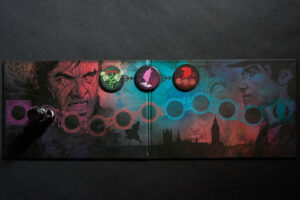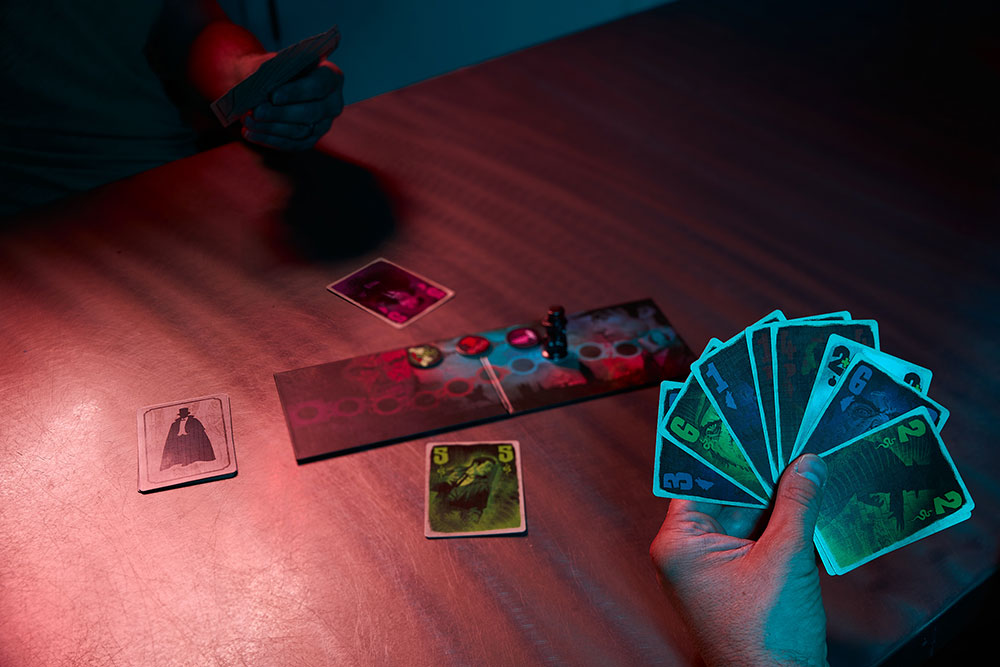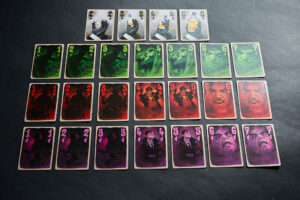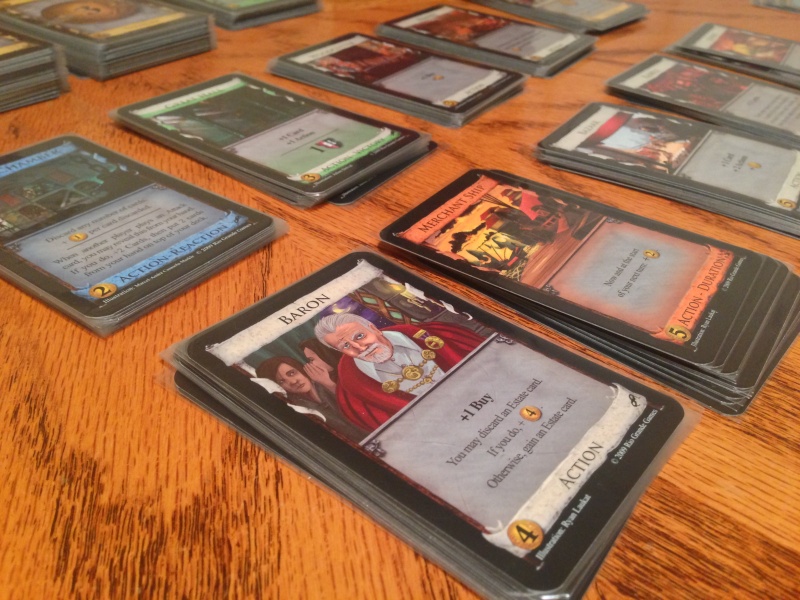 The characters of Jekyll and Hyde continue to be an interesting dichotomy in the duality of human nature. The archetypes have crept their way into modern pop culture in more ways than one, and the psychology continues to fascinate.
The characters of Jekyll and Hyde continue to be an interesting dichotomy in the duality of human nature. The archetypes have crept their way into modern pop culture in more ways than one, and the psychology continues to fascinate.
Which side of us is stronger? Is coexistence possible? I was curious how some of these ideas would be expressed in Jekyll vs Hyde. I anticipated a tug of war, but what I found felt more dynamic.
Gameplay Overview:
Jekyll vs Hyde plays out over three rounds. At the beginning of the game, players choose which role they will represent, Jekyll or Hyde. Hyde’s goal is to reach the end of the Identity track by the end of round three; Jekyll wants to keep that from occurring. How does this track progression occur? At the end of each round, after assessing how many tricks each person won, the mathematical difference determines how far the tracker moves, as Dr. Jekyll risks losing his identity. Playing as Hyde, your prerogative is to create as much of a mathematical difference in tricks won each round. As Jekyll, closing that gap is your only strategy to stave off a psychological pitfall.

The game consists of three suits numbered two through nine. There is no priority of which suit is stronger. That is, until the first card is played at the start of a round. This suit is now considered the “weakest.” The card lead must be followed as you’d expect, with the highest-numbered card winning. The second suit to be played becomes the second strongest, and, by process of elimination, the third suit is the strongest. These reset at the start of each round, but they can also be changed by using potions.
Potions bring chaos to the game. A neutral suit that can be lead or followed, they trigger certain effects depending on which suit the opponent plays. As an example, a number 4+ potion and a purple 7, the winner of this trick would steal a trick previously won from the other player. A green card would force players to exchange two cards with one another. The red card resets the current suit ranking, possibly changing up a strategy mid-round. An additional caveat, potion cards have a plus symbol (that wasn’t a typo earlier). So, between a potion 4+ and a green 4, the potion wins, having a higher number.

Game Experience:
As I said earlier, I anticipated Jekyll vs. Hyde being a tug of war. It’s a mechanic I love in games like Watergate and thought it’d be a perfect thematic fit. But it presents something entirely different. One of the most interesting aspects of this game is how much roles change your play style. Dr. Jekyll needs an inner balance to succeed, like in Fox in the Forest. Mr. Hyde will have a fun time trying to do the opposite of their opponent. Of the two roles, I found Mr. Hyde the most enjoyable to play. He felt like the embodiment of chaos. But because these roles play so differently, players might miss out on half the enjoyment. Unless, that is, they play a second game.

I don’t always explore alternate or advanced ways to play a game when it’s suggested in a rulebook. It just depends on how much I enjoyed the standard game. In Jekyll vs. Hyde, there’s an advanced variant and I would encourage anyone who enjoyed their first play to try it out. In it, players play two games, switching roles each time. At the end of each three-round game, the Mr. Hyde player scores up to ten points for reaching the end of the Identity track. Whoever scored the most points or achieved this in the least amount of rounds wins. This flavor of variant is one I can get behind. There’s not a new ruleset and the only added requirement is your time. Gameplay is already short and this allows players to fully appreciate the game. This has because my default way to play and I think it will be for others too.
Overall, I don’t have any negatives to say about Jekyll vs. Hyde. It’s a quick-playing game that’s easy to teach. The gothic-inspired art from Vincent Dutrait adds an appealing grit to the components. Symbols represented on the suit tokens and cards will assist any color-blind players. The game’s components don’t appear undercut. The cards feel as though they will hold up to several plays and the hefty-weighted metal tracker adds a nice tactile experience as you inch towards losing yourself.
Final Thoughts:

Where does Jekyll vs. Hyde stack up against other trick-taking games, specifically those for two players? That’s going to be for you to decide. While I certainly haven’t played everything out there and am in no position to give an exhaustive list, I’ll offer these thoughts: fans of trick-taking games should play this. Jekyll vs. Hyde is an enjoyable experience, although maybe not as satisfying when compared to other favorites.
The Crew is still the best trick-taking game I’ve played (although the two-player variant is the worst kind of afterthought) and my all-time favorite. Fox and the Forest is more tactical, and I think it’s safe to assume it’ll become an evergreen title down the road. Although I’m terrible at Skull King, I’ll play with a fun group. Jekyll vs. Hyde is not the worst trick-taker, but it’s also not in the upper echelon. On its own, it fares quite well. I wasn’t disingenuous in praising it. But I also know that we compare and contrast games we’ve previously played, and we make lists and rankings.
I’m a fan of trick-taking games, so I’m always interested in trying out a new one. Sometimes they hit, other times they don’t. Sometimes good ones in that bunch live somewhere in the middle ground for your attention. I think that’s where Jekyll vs. Hyde resides for me. I’d be interested in where you place it.
Final Score: 4 Stars – A solid trick-taking game with some interesting dynamics
 Hits:
Hits:
• Lovely gothic art to match the theme
• Playstyle changes depending on the role you choose
• Solid component quality
• Quick and easy to teach
• Changing priority of suits and potion cards add dynamism
Misses:
• Might get lost in the shuffle if you’re an avid fan of trick-taking games






















